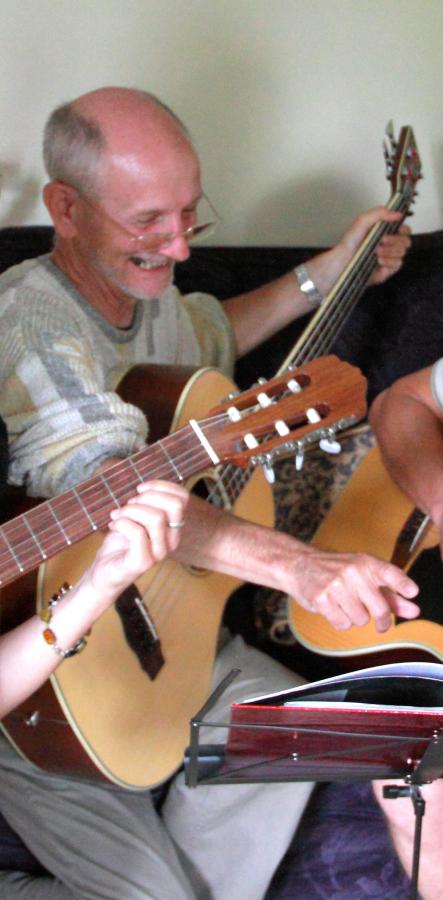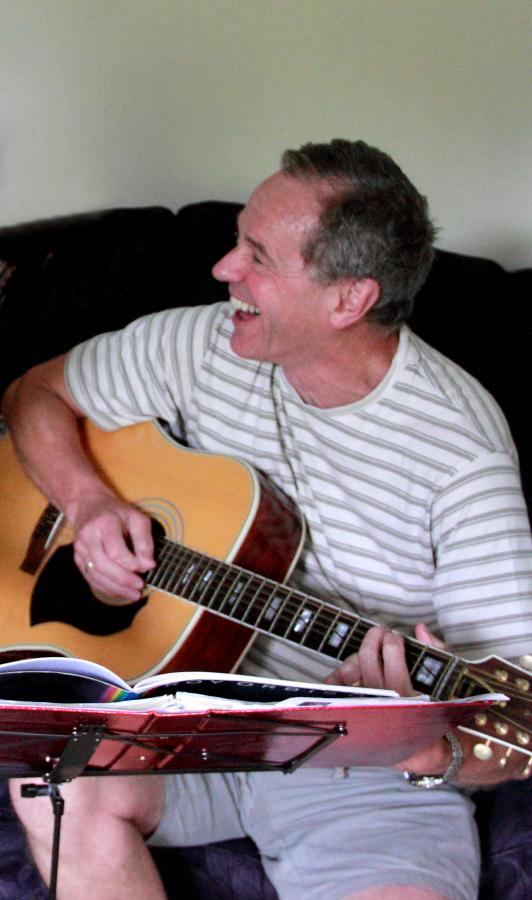- Home
-
Poetry
- Community development
�
Top hundred music tracks
Let’s face it, you’re probably never going to be invited on to Radio 4’s “Desert Island Discs” to tell the world about your eight favourite music tracks. But that shouldn’t stop you choosing them, should it? And if you really love popular music – and you’re not just picking songs to appear “sound” or “right on” to an audience – you surely can’t be confined to eight? Why not go for broke and choose your personal all-time Hot One Hundred? And while you’re about, why not explain exactly why you like each of them?
 Mel
MelBack in 2015, three friends – that’s Peter Rowlands, Mel Witherden and Nick Andrew – who had first met as English literature students in the 1960s decided we would do the job properly. Rather than merely spending the rest of our lives exchanging acerbic emailed rants denouncing the parlous state of British government, the decline of punctuation and grammar, and the flaws in our media, as we’d done for years, we’d also try to say something nice for a change. We’d talk about the music that mattered to us.
![Nick caption|[SP][SP]Nick](https://www.melwitherden.co.uk/uploaded/popup/Nick.jpg) Nick
NickWe would aim for a hundred music tracks each: a hundred of our lifetime’s favourites, picked for their intrinsic value or because of their associations, or perhaps for both reasons. And we would explain the rationale behind our choices to each other: not in order of preference, just in the order in which they sprang to mind.
We weren’t going to prove anything. It was just a game (and that’s still what we call it). But like all good games it was worth playing well.
 Pete
PeteOur selections were exchanged by email in batches of three or so at a time, without any timetable or deadline. This relaxed approach probably contributed to the success of our barmy plan; it meant we could follow through at our own pace. In reality, that freedom didn’t stop us from hassling each other when too much time seemed to have passed between submissions (Pete readily admits to being the worst offender), but it was all done in good part. We played the game not out of any sense of obligation, but because there was always something we wanted to say.
In practice it became an ongoing project, prompting us to keep in periodic touch with each other. And remarkably, despite our very different personalities and the other competing commitments of our lives, we actually followed through, though the process ultimately took eight years to reach its conclusion.
This compilation
What we’ve placed on this site is most of what we’ve emailed to one another in pursuit of our respective One Hundred Greatests. Our choices are shown in the order we circulated them, together with the responses we received, and in some cases our irritated, grateful, touched or pained responses to those responses.
It may seem astonishingly indulgent to have assembled our ramblings in this way on the off-chance that someone else might be interested. But in our defence (a) we were provoked into making this compilation by people who heard about them, and (b) there’s so much enthusiasm, insight, joy and – yes – love in these thousands of words that not to share them would feel like neglect. We hope readers think it was worth the effort.
The dramatis personae
Unlike the guests on Desert Island Discs, who are selected either for being celebrities or for being “worthy” in some way, we three had no great claim to fame. None of us was a music expert or professional; we were simply lifelong pop music enthusiasts.
 Pete
PetePete knows how to strum a guitar and claims to have learned “a bit about music theory”. (It’s not clear where this talent came from, but it’s certainly a lot more than “a bit”.)
Nick, too, could play more than a chord or two, and as an adolescent had briefly performed in amateur bands.
Mel claimed to be tone-deaf, and had no pretentions towards understanding the technicalities of music. In fact he was in awe of Pete’s musical analysis and the enormous range and depth of Nick’s interests. But he instinctively appreciated the basics of melody, rhythm and arrangement, and was the one most consciously immersed in the poetry of the lyrics.
These differences turned out to be a source of enlightenment. Even when there was hearty agreement on the merits of someone’s choice it was likely that our comments would include three contrasting takes – Pete focusing on some subtle chord change, perhaps; Mel probably going on about the rhyme scheme; and Nick eruditely recounting the studio history of the bass guitarist.
The music choices
 Nick
NickConsidering we were born within 16 months of one another, and spent many hours listening to LPs together in one another’s college rooms (while one of us was a also notorious music pirate who preyed on the other two with a reel-to-reel tape deck), our tastes were surprisingly diverse when it came to refining our hundred favourites. The music we eventually selected provides an extraordinary journey through a hugely broad range of periods and styles that stretches back long before the 1960s and reaches forward to something which we ageing codgers like to consider “the present day”. Up to the recent past, anyway.
Our lists defy any attempt at pigeonholing or categorisation. The Beatles and Dylan are there, of course; but so are Duke Ellington, Flanders and Swan, the cast of “West Side Story”, Buddy Holly, Elton John, Tom Waits, Ali Farka Touré, Mary Coughlan, Oasis (in two quite different incarnations), Richard Thompson, Take That, and the MonaLisa Twins.
Perhaps inevitably, the music over which we were unanimous in approval mostly dated from our formative years – the late 1950s and especially the 1960s. Mel and Pete in particular admitted we could have drawn even more heavily on that period for our selections, though it became clear that Nick had remained impressively open-minded and enquiring, and had embraced a striking range of later musicians and styles.
What we learned about each other and bass guitars
Nick, it emerged, had been an avid concert-goer throughout his life, starting before the three even met. It soon became a running gag that whatever acts the other two mentioned, he had probably seen them performing live. Mel once triumphantly declared that Nick couldn’t possibly have ever seen Cuba’s Buena Vista Social Club play. But he had. Twice. Once in the UK and once in Havana. One of Nick’s specialities was identifying the backing musicians on even quite obscure tracks, and cross-referencing them with other tracks on which they appeared. Yet another educational eccentricity of his was to define the precise brand and model of guitar – and often its colour – he’d seen on stage.
 Mel
MelMel was arguably the one who had thought most profoundly about the fusion of lyrics and music in his selections, and sometimes surprised the others with the depth of meaning he had extracted in some of his choices. It’s an open question, though, whether his interpretations ever really persuaded Nick and Pete.
Pete was revealed as a self-confessed populist, whose instincts often led him to pick music that was first and foremost tuneful – sometimes evoking muted disdain from the other two. (Anything from the charts after about 1979 tended to provoke curiosity if not outright suspicion.) But Pete could hold his ground with painstaking analyses of the musical constructions that underpinned his choices, determined to show that they could add weight to otherwise anodyne lyrics. Similarly he sometimes revealed hidden magic in the choices of the others.
Occasionally one of us would just launch unprovoked into a minor essay addressing some peripheral subject sparked by a song. We’ve included some of these in the mammoth compilation on this website. If nothing else, they are evidence of the power of music, but they are invariably revealing in their own right.
As will be evident, music has offered us a remarkable opportunity to exercise intellectual muscle in our later years, but that’s only because it has been a potent emotional force throughout our lives. This means it has sometimes been hard to separate our celebration of the intrinsic excellence (the subjective merits, anyway) of our favourite recordings from the reactions we had when we first encountered them. Each of us (some more indulgently than others, Mel) has shared experiences and feelings that the others were probably unaware of – times of loneliness, depression, broken relationships, the death of a friend. It’s hard to think of another context which we might have opened up like this.
For three friends who knew one another for more than 50 years, recognising these powerful private instincts and emotional triggers seemed, largely imperceptibly, to bring us closer together. This was an unspoken joy which none of us was expecting – and something which Nick’s wife Margaret has touchingly confirmed more recently.
The last lap
The gesture at Desert Island cannibalism and its exposure to public view have a particularly sad source. By early 2022 we sensed that we were on the last lap; we’d all selected nearly 90 of our allotted 100 tracks. Then Nick spoiled the whole show by importunately dying – leaving the sum total of his selections dangling at a tantalising 87. The other two of us decided to soldier on and complete our own respective top 100s, commenting on each other’s tracks as before. Nick’s family considered attempting to complete his 100 choices on his behalf, but in the event we’ve left his total at its final 87.
The legacy
The combined comments and responses of the three of us have turned out to be a monumental tome (as long as several novels). But what does it add up to? We see it as a celebration of a wide range of music and its performers from the past eighty years; but you could equally look on it as the pretentious ramblings of three old geezers bent on flexing their intellectual muscle – albeit with a generous sprinkling of irony and self-deprecation.
Perhaps it’s both. It’s certainly also a poignant insight into the different temperaments, interests and histories of three individuals who had found friendship and common ground in their love of music.
We commend the game to music lovers everywhere. There’s no telling where it will take you.
To Nick. We’re not going to forget you.
Pete and Mel
The rules of the game
Clearly some “rules of the game” were called for, though Pete, who first came up with the idea, was keen to recommend: “This is supposed to be an amusing diversion, not a chore or a rigorous test, so although I’m suggesting rules, there are no invigilators, and no one will be sent off for breaking them.”
Key rules included:
Length
Commentary was to be limited to 150 words per track. Predictably for three English graduates whose careers had variously depended on using lots of words, this rule was abandoned within weeks, and comments often ran to many hundreds.Style of music
Music could be from any period of the twentieth or twenty-first century, could be pop, jazz, folk or show music (e.g. Kern, Hart, Hammerstein), and could be songs or instrumentals, but not classical music in the accepted sense. Film music was also allowed.Approach
The comment could be “practical exposition, wit, whimsy or anything in between”. Happily it turned out to be all these things, and more.Responses
On receipt of a batch of tracks, the other two of us would reply with comments on each of them. Did we already know and love it? Was it new to us? What had its selection revealed to us about the track, the performer and the person who had picked it?Good practice
Pete’s rule book added: “Expressions of surprise and perplexity are allowed, but NOT contempt!”This rule was largely observed, though a few negative or dismissive comments occasionally provoked a degree of indignation on the part of a recipient, even when they’d been made with tongue in cheek. We seem to have resolved these issues; at any rate, we all kept on coming back for more!
Links to the music
Each selection had to be accompanied by a hyperlink to a YouTube rendering of the track by the original artist. This allowed for choice in performance, and provided instant online access to the music without reliance on a paid-for streaming service. (YouTube links change frequently, so unfortunately we can’t guarantee that these will work, though an alternative can usually be found.)The music videos
Pete strongly urged the others not to view the YouTube videos when listening to the tracks, or at least not to pay too much attention to them, since he regarded them as a potential distraction. Inevitably, we all did watch them to a greater or lesser extent. Arguably there were instances where this actually enhanced our listening experience, though there were others where it adversely coloured our impression of the track. Either way, there was no legislating against it.Unresolved issues
Duplication
What should happen if one of us wanted to pick a track that someone else had picked already? Should we submit it again, or assume it had somehow been pre-empted? Were these tracks to be our individual top one hundreds or the sum of our collective enthusiasms and insights? We never decided, and there were sometimes unresolved complaints that “If I’d know you were going to pick that I would have got there first!” Some tracks considered to be truly outstanding – the Beatles Strawberry Frields and Dylan’s Visions of Johanna for instance – have got a double look-in, on other occasions an avoidance tactic was to pick another equally loved track by the same artist.Substitutions
Should we be allowed to recant over previous selections and submit alternatives? Pete was strongly in favour of permitting this, arguing that enthusiasms for songs could ebb and flow so choices shouldn’t be fixed in time. Mel and Nick never once suggested that this was because Pete had grown ashamed of some of his pop-chart favourites, but whatever his reasons, they took a more rigorous and puritanical view, arguing that swapsies had to be disallowed.Later on, a radical compromise was floated, in which Pete and Mel would assume control of the slots which Nick didn’t get round to using; but this was never pursued.
In the end, Pete and Mel cautiously ceded the point, and decided to allow a small number of switches each. We’ve acknowledged these in our commentaries.
- Community development

